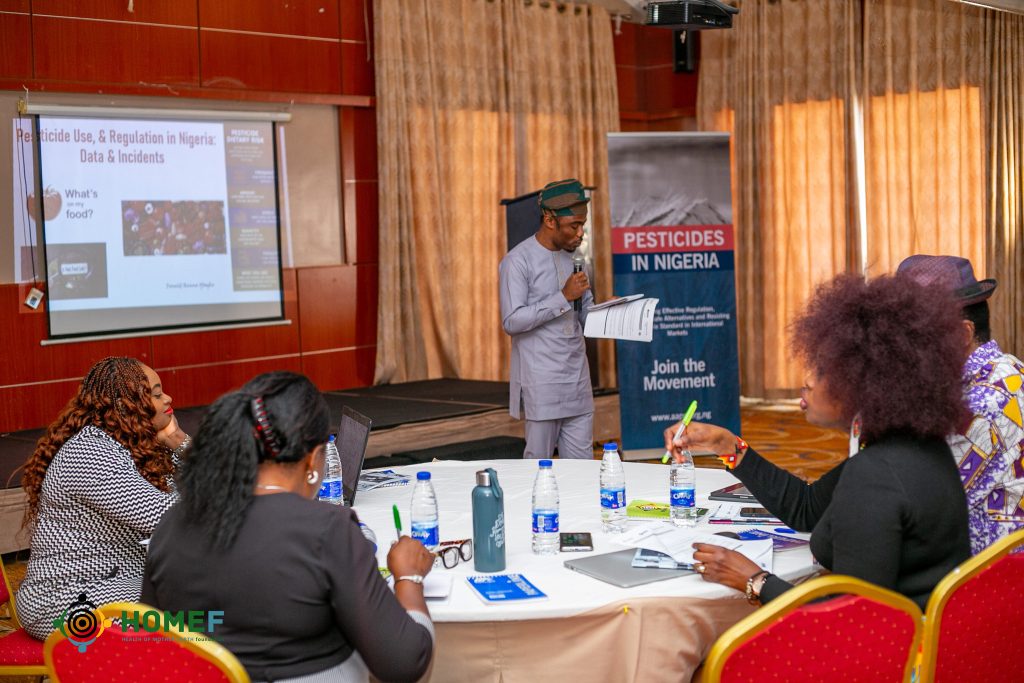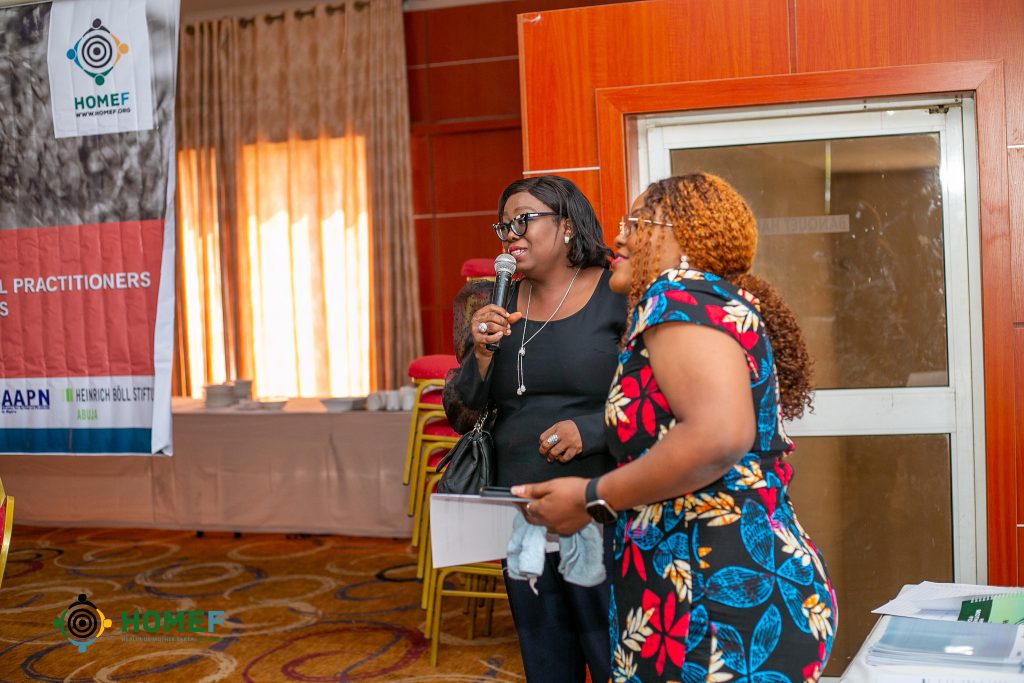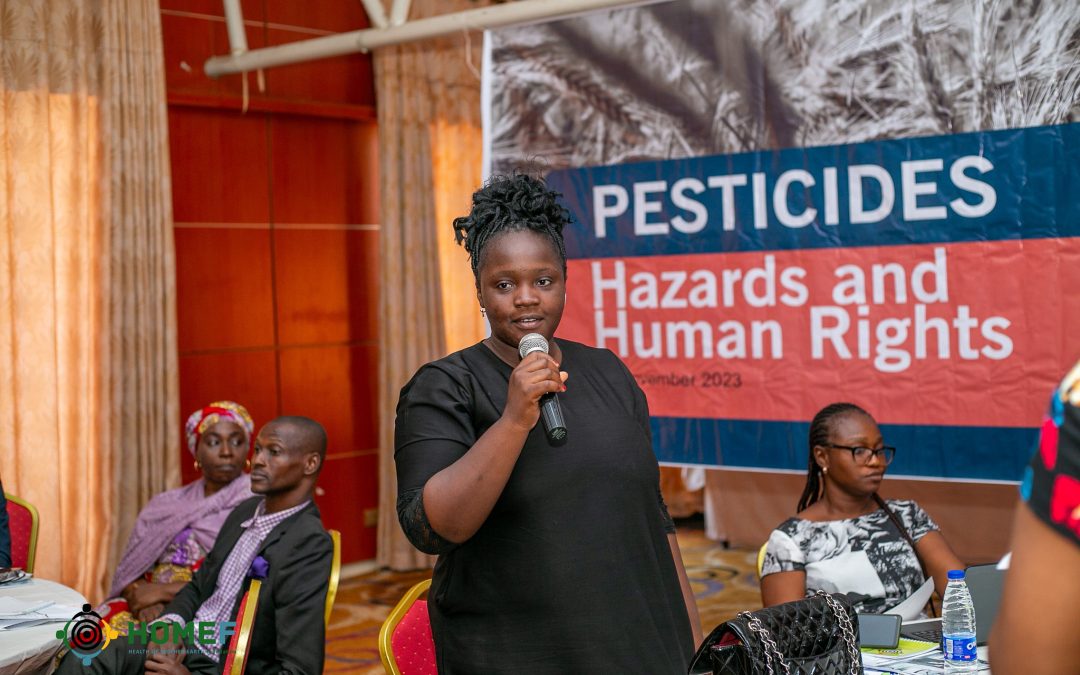Background
The insurgence of chemical pesticides has been accompanied by growing concerns about the impacts of these products on humans, biodiversity, and the environment. In recent months, successful litigation across the globe against pesticide manufacturers has revitalized the possibility of holding corporations and governments to account for the harmful effects of pesticides.
In response to the rulings, United Nations experts acknowledged that “unsafe and excessive use of chemicals has negative impacts on a wide range of human rights, including rights to life, food, water, health, as well as to a healthy environment.” Approaching the problem from a human rights perspective emphasizes the reality that the impact on one or more human rights can create a domino effect, affecting the realisation of other rights.
Ensuring the safety and sustainability of Nigeria’s agricultural sector, environment, and public health requires a united effort at the local and national levels, with collaboration among various stakeholders such as government entities, civil society organizations, and the international community. To address the risks associated with harmful pesticides and regulate the rapid introduction of GMOs, it is crucial to adopt a coordinated approach. By enacting proactive legislative and policy measures, Nigeria can establish a foundation for a secure and environmentally friendly agricultural future.
In Nigeria, stakeholders are yet to voice concerns about the human rights impacts of the use of highly hazardous pesticides. It is on this premise that the Health of Mother Earth Foundation (HOMEF) and the members of the Alliance for Action on Pesticide in Nigeria (AAPN) with the support of the Heinrich Boell Stiftung Nigeria (HBS) organised training to foster a deeper understanding of the legal and human rights aspects of pesticides hazards.
The Event
The training which was held at Broadfield Hotel, Abuja on Tuesday, 7th November 2023 had in attendance over 40 participants including legal practitioners, rights groups, farmers, members of civil society as well as representatives from the National Food Drugs Administration and Control (NAFDAC) and the National Environmental Standards and Regulations Enforcement Agency (NESREA) and other institutions such as the Nigerian Bar Association, Nigerian Law Reform Commission, Legal Aid Council, Nigerian Institute of Advanced Legal Studies, and Justice, Development & Peace Commission.
Amongst others the event: highlighted key data and incidences of pesticide poisoning; examined the prospects of litigation as a means to enforce workers’ and consumers’ rights; and identified necessary actions required for an improvement of the regulation of pesticides in our agricultural sector. It was noted that the right to life and the right to a good environment are guaranteed rights according to the African Charter and the 1999 Nigerian constitution and are instrumental in the fight against hazardous pesticides.
Some Key Observations
- Domino Effect: the meeting emphasized the domino effect that the violation of one human right can have on others, making a case for the comprehensive consideration of the impacts of pesticides on a range of rights, including life, food, water, health, and a healthy environment. Chemical pesticides disrupt the right to a healthy environment, the right to food and food sovereignty, and the right to participation and information.
- Wrong Farm Practices: Nigeria’s agriculture/ farm system is largely conventional monoculture, which depends on highly hazardous chemical pesticides (HHPs); many of which are already banned internationally. This farm system (monoculture) is vulnerable to pest attack, and adverse climate change, consumes a lot of water, and destroys soil health.
- Pesticide Use & Double Standard: 94.2% of surveyed farmers in Nigeria use chemical pesticides. Over 50% of the used pesticides are in the category of Highly Hazardous Pesticides (HHPs) category. Approximately 40% of these pesticides registered in Nigeria are already banned in Europe due to their adverse effects on human health, biodiversity, and the environment.
- Chemical Composition Concerns: Threat to Our Health & Right to Life: A 2020 study on 1004 registered chemical pesticides in Nigeria reveals alarming findings: Twenty-five (25) contain proven carcinogenic active ingredients. Forty-seven (47) include active ingredients that are endocrine disruptors. Sixty-three (63) have mutagenic active ingredients. Two hundred and sixty-two (262) consists of neurotoxic active ingredients. Two hundred and forty-four (244) exhibit clear effects on reproduction.
- Lack of Awareness: Over 80% of surveyed farmers are unaware of the chemicals they use on their farms. Similarly, consumers are uninformed about the chemicals present in their food, highlighting a widespread lack of awareness regarding pesticide use.
- Deceitful Marketing and Non-Disclosure Practices: the meeting recognized the prevalence of deceitful marketing and non-disclosure practices by agrochemical companies, manufacturers, marketers, and promoters of pesticides regarding the full dangers of their products. In many instances, even the manufacturers and marketers of pesticides in Nigeria do not know the associated hazards caused by the products they sell or promote.
- Promoting Transparency and Accountability: The event acknowledged that inadequate information disclosure contributes to the uninformed use and exposure of hazardous pesticides in Nigeria. Since, NAFDAC and NESREA are responsible for the entry, approval and registration of most chemical pesticide products in Nigeria, they should also be held responsible and accountable for the associated hazards from the use and exposure of the highly toxic pesticides they have registered. The same should apply to the manufacturers, marketers, promoters, extension workers and primary user(s).
- Right to Know: The event underscored the significance of the “Right to Know” as an inherent human entitlement. It recognized that every Nigerian citizen possesses the right to obtain precise and comprehensive information regarding the pesticides to which they may be exposed. This empowerment allows individuals (citizens) to make informed decisions, safeguarding their entitlements to life, health, and well-being, as articulated in Section 39 (1) of the 1999 Constitution of the Federal Republic of Nigeria (CFRN) and Article 9 of the African Charter on Human and People Rights (enacted in 1983). The denial of accurate and comprehensive information to Nigerian citizens, compromising their rights to life, health, and well-being, is justiciable under the Nigerian constitution.
- Global Legal Trends: the meeting acknowledged the global trend of successful litigation against pesticide manufacturers, farms and marketers. The participants noted the fact that a lot of Nigerian farmers, farm workers, communities and consumers are unjustly exposed to pesticide hazards due to poor/misinformation, lack of disclosure of hazards, poor and unmonitored work conditions, and lack of implementation of regulations on work safety, labour rights, environmental safety, etc.
- Promoting Workers’ and Consumers’ Rights: The event observed the lack of advocacy for the exploration and promotion of litigation as a means to enforce workers’ and consumers’ rights affected by the exposure and use of hazardous pesticides. There is a need to support legal initiatives that hold corporations accountable for the health and well-being of farm and factory workers, consumers and communities.
- Class Action Lawsuits: There is need to explore the possibility of initiating class-action lawsuits against pesticide manufacturers, marketers, farms and promoters on behalf of affected persons and communities, emphasizing the collective impact on human rights, health, and the environment.
- Absence of Comprehensive Legislation: Nigeria lacks a national law or legislation governing various aspects of pesticides, including production, importation, export, licensing, trade, use, and application. The event stressed the importance of enacting proactive legislative and policy measures to regulate the use of harmful pesticides and to create a foundation for a secure and environmentally friendly agricultural future.
- Contentious Pesticide Legislation Bills: HB 2224: National Fertilizer and Agricultural Pesticide Control (Repeal and Re-enactment) Bill, 2023, sponsored by Hon. Olanrewaju Ibrahim Kunle, and HB 1396: Nigeria Pesticide Council (Est) Bill, 2021, sponsored by Hon. Dandutse Muntari Mohammed (now senator). Agro-Company Interests Over Public Welfare: the two contentious bills were introduced with the primary aim of legislating over pesticides in Nigeria. However, the design of these bills raises concerns, as they appear to prioritize the interests of agro-companies rather than safeguarding the well-being of the Nigerian people. Their focus on removing perceived registration barriers for these companies raises questions about the potential impact on public health and safety.
- Regulatory System Challenges: Existing pesticide regulatory systems exhibit significant deficiencies, including overlaps in function, a lack of synergy, ambiguous processes, and inadequate institutional support from the government – poor budgeting. These shortcomings contribute to challenges in effective pesticide regulation and oversight.
- Policy and Legal Void for Pesticide Alternatives i.e. Organic Sustainable Farms at Sub-National Levels: At the subnational level in Nigeria, there is a notable absence of legislation and policies specifically addressing the need for organic sustainable farms. This legal gap leaves organic farmers without clear guidance, potentially resulting in ambiguity and inconsistency in standards, and over-dependence on these highly toxic chemicals.
Key Recommendations: Call to Action to MDAs, Right Groups and Professionals
Litigation Strategies:
- Promoting Workers’ and Consumers’ Rights: CSOs, Farm worker’s Associations, Labour Unions, Nigeria Bar Association (NBA), FCCPC, legal rights groups, human rights defenders and communities, should advocate for the exploration and promotion of litigation as a means to enforce workers and consumers’ rights affected by the use of hazardous pesticides. Support legal initiatives that hold corporations accountable for the health and well-being of farm workers and consumers.
- Legal Aid and Support Networks: Establish legal aid and support networks for individuals and communities adversely affected by pesticide exposure. Communities, farm workers and CSOs collaborate with legal practitioners and rights groups to assist in seeking legal remedies.
- Documentation of Incidents: The Federal Ministry of Health, Public Health Agencies, CSOs and farmers associations should encourage the systematic documentation of incidents related to pesticide poisoning, environmental harm, and human rights violations. This documentation can serve as crucial evidence in legal proceedings, as well as informed health records on pesticide toxicity and incidents for policy improvements.
Human Rights Advocacy:
- Human Rights Education Programs: AANP and other governmental groups like the National Orientation Agency (NOA), Farmer’s Associations, Farm Workers Associations, Nigeria Labour Union (NLC) and other people-centred groups should implement pesticide and human rights education programs targeting various stakeholders, including farmers, consumers, legal practitioners, and government officials. The aim is to foster a deeper understanding of how pesticide use can affect the realization of fundamental human rights.
- Legal Empowerment Workshops: The Nigerian Bar Association (NBA), Ministry of Justice, legal and human rights groups, labour unions, religious groups and AAPN, should collaborate more to conduct legal empowerment workshops to equip communities and farmers with the knowledge and tools needed to advocate for their rights. This includes understanding legal frameworks, accessing legal aid, and navigating the legal system. Similar workshops are also needed for legal practitioners and judges.
- Engaging International Human Rights Mechanisms: Explore avenues for engaging international human rights mechanisms to raise awareness about the human rights impacts of pesticide use in Nigeria. This could involve submitting reports to relevant UN bodies and seeking support from international human rights organizations.
Legislative and Policy Advocacy:
- Incorporating Human Rights in New Pesticide Legislation: The public and CSOs should continue to advocate for the urgent development and implementation of comprehensive national pesticide legislation and policies to regulate the production, use, and importation of hazardous pesticides, considering human rights and environmental impact. Support the Alliance for Action on Pesticide in Nigeria (AAPN) as they work with consumer protection agencies, government food, and environmental regulatory agencies to come up with a new Pesticide Control Bill 2023. The bill will primarily aim to protect the health of Nigerians, protect their biodiversity and prevent foreign influence in our food sector. The bill will be drawn from international best practices – ensuring the safety of life, application of precaution, and openness in the pesticide approval process, ensuring informed consumer choices via full disclosure, and promoting integrated pest management (IPM) approach and safer farm practices, etc.
- Stakeholder Consultations for Policy Development: The National Assembly Committee on Agriculture, NAFDAC, the Federal Ministry of Agriculture, NESREA, etc, should facilitate wide stakeholder consultations in the development of policies related to pesticides and organic agriculture. Ensure the inclusion of perspectives from human rights advocates, affected communities, and legal experts to create comprehensive and rights-focused policies.
- Monitoring Compliance with Human Rights Standards: NAFDAC, AAPN, FMARD, etc should establish mechanisms to monitor and ensure compliance with human rights standards in the enforcement of pesticide regulations. This includes regular assessments of government and corporate practices against established human rights benchmarks on chemical pesticide management and exposure in Nigeria.
Capacity Building:
- Promotion of Sustainable Farming Practices: The Ministry of Agriculture and Rural Development should promote sustainable farming practices that reduce reliance on chemical pesticides, such as integrated pest management systems, companion planting, and organic alternatives.
- Consumer Awareness Campaigns: CSOs and concerned ministries, departments and agencies should conduct consumer awareness campaigns to inform the public about the hazards of pesticides in food, promoting informed choices and encouraging support for pesticide-free alternatives.
- Revitalization of Agricultural Extension Services: the Federal and State Ministries of Agriculture should revive the agricultural extension service system across various local government areas to equip farmers with agroecological knowledge and skills, and reduce the dependence on highly hazardous pesticides.
- Empowering Consumers and Farmers: Faith-based groups, CSOs and Consumer-protecting agencies should encourage consumers and farmers to take a firm stance against hazardous pesticides, and advocate for accountability from agencies and institutions responsible for safeguarding food, emphasizing the right to a safe and healthy food supply.







